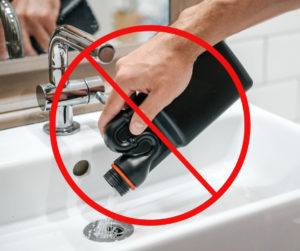It’s a table where you need no reservation…The Periodic Table, that stumbling block in your high school chemistry class and today we celebrate its’ 150th year.
But while NaCl has made it to the top of your table, it’s what you pour down your drain that could be the chemical equation you need to know the most about. Grease, soap, hair, and last night’s leftovers— all contribute to that un-plungeable globular clog. But before you reach for that chemical cleaner to make it go away, you should take a closer look at what’s in those harsh household products.
What’s in chemical drain cleaners
Most chemical drain cleaners use sodium hydroxide (also knows as caustic soda or lye) or sulfuric acid. These chemicals are extremely corrosive to organic materials and metals. The chemicals are bases so they give electrons to the clogging substance and their hydroxide ions create the reaction that clears the clog. Their alkaline chemicals release heat and turn grease into a soap-like substance that is more easily dissolved, according to How Stuff Works. Because the drain cleaners are heavier than water, they sink through any standing water attaching to the clog.
Other cleaners use household bleach, peroxides and nitrates. These chemicals cause the organic material that is causing the clog to lose electrons and become oxidized.
What happens when you use chemical drain cleaners
Bottom line, because what most of these chemicals produce heat, they can soften the properties of a PVC pipes and can eat away at older, metal pipes.
In addition to harming your pipes, chemicals included in drain cleaners can be harmful to your health. They are dangerous to your skin if you don’t wear gloves or take precautions not to inhale them.
Chemical drain cleaners can also hide bigger problems with your plumbing system. Your clogged pipe can be just a symptom. Drains clog because of improper disposal of grease or fibrous materials in your garbage disposal or it could be something of a larger nature like a backed up sewer line, a broken pipe or a clog lodged deep in your drain.
Chemical-free ways to decalog your drain
So you didn’t memorize the periodic table, which is just fine because to clear a simple clogged drain you only need to remember baking soda and vinegar.
First, pour a pot of boiling water down the clogged drain and follow it with cold water. The combination just might clear the simplest clog. If not try treating the clog with a half a cup of baking soda followed by a half of a cup of vinegar. Let the mixture sit over night and then flush the drain with hot water. It’s a good idea to use this mixture once a month for preventative maintenance.
Sometimes when you’ve got a clogged drain you don’t need a chemist, you need a plumber. And the good news is our Len The Plumber experts are the best in the business when it comes to fixing your clogged drains! We have the latest in drain cleaning equipment to solve all your issues. And you can feel confident knowing that at Len The Plumber you’ll get fast, reliable service 7 days a week, 24 hours a day.

No comments:
Post a Comment